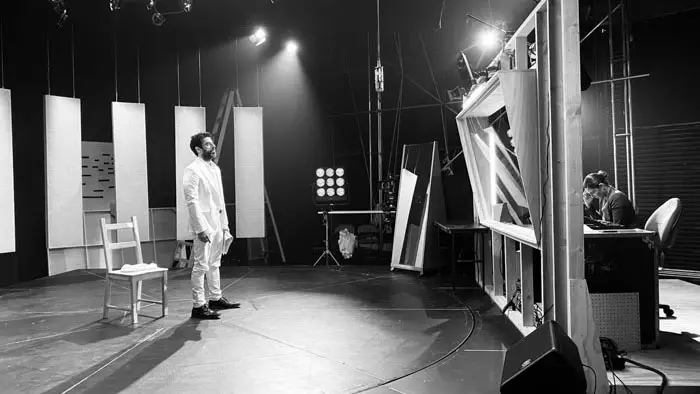Late actor-activist Juliano Mer-Khamis shapes the core of Michael Moshe Dahan’s ‘Sure. Repeat. No.’ A movie inside a movie, this high-concept, thought-provoking narrative options three actors competing for a lead half for director Yael. Auditioning as interchanging shades of character sorts, all impressed by totally different personas of Mer-Khamis, the three actors interact in conversations that make them query one another about their identities and roles within the long-standing battle between Israel and Palestine. Traversing varied notions, beliefs, and views all through, Sure Repeat No ultimately questions whether or not we’re formed by holding on to the previous or transferring forth and ushering in newness whereas not forgetting completely about it.
Excessive on themes, heavy in conversations, and pushing you, the viewer, right into a simultaneous evaluation whereas experiencing this well-crafted experiment, Sure Repeat No is a captivating enterprise that gives an anti-war sentiment whereas reflecting conditions throughout sides in an iconic tribute to Mer-Khamis, performing arts, and filmmaking. It’s a mix of beliefs that comes ahead by way of statements and remarks in probably the most uncommon but engaging method – by way of an unpredictable and sincere manufacturing.
Discussing every little thing from the movie’s backdrop, themes, and manufacturing course of to the casting, subtexts, and the very conception of it, I sat with director Michael Moshe Dahan, producer Sarah Szalavitz, and solid members Salome Azizi, Karim Saleh, Mousa Hussein Kraish, and Adam Meir.
Why Juliano Mer-Khamis? How did you study him, his filmography, and his work as an activist? Or say, how did he discover you and turn out to be the supply of the film?
Michael: I used to be attempting to curate an exhibition with Israeli and Palestinian artists engaged on inter-generational trauma. And I used to be individuals engaged on movies regarding the aftermath of Nakba [Palestinian Catastrophe], after the occupation, and even three or 4 generations after the Holocaust. And that led me to satisfy some superb artists. However they didn’t need to be in the identical room. They didn’t want their work to be exhibited collectively.

“…conversations that make them query one another about their identities and roles within the long-standing battle between Israel and Palestine.”
As a result of Palestinians didn’t need to be tokenized as a result of I’m an Israeli-American, Israelis resisted as a result of they felt delicate about potential backlash. I had three months to fill a gallery, and the gallery director mentioned. “You’re a filmmaker; why don’t you make a movie?”
Then, I spoke with somebody who warned me that it’s harmful to tread upon this situation – to occupy each realms concurrently. And that one one who tried to do this suffered for it. And that was Juliano Mer-Khamis. Finally, throughout my analysis into him, once I noticed that he talked about his assassination in a predictive approach and that he actually was assassinated in the identical method, it made me understand that there’s bought to be a film right here.
Sarah: I’ve a special relationship with the fabric. I’ve studied the peace course of in Northern Eire and Israel. And on the level when Michael had begun engaged on this, I used to be approached by another individuals about what was occurring in Israel and Palestine, discussing what approaches could possibly be taken. As a result of loads of what’s occurring there, or the USA right here, isn’t dissimilar to what’s occurring in India by way of the way in which sure teams are fostering hatred. So, I used to be seeking to be concerned in such a challenge, and Michael and I’ve been finest pals for eternity.
There are two various factors lined up right here. I imagine Juliano was a wonderful illustration of the complexity [of the conflict] of what we wished to painting. And curiously, some extra such complexities have come out for the reason that movie. As an illustration, Chaim Topol [he played Tevye in Fiddler on the Roof], who just lately handed, was revealed by his household as an asset to Mossad in his later profession. That form of data, I imagine, provides up one other degree or layer to what we have now introduced within the movie [which is reflecting on the conflict through an actor’s perspective].
Michael, you say that artists from Israel and Palestine have been skeptical of involving within the challenge. Has anybody from the viewers, from Israeli or Palestinian backgrounds, approached you post-screenings? And if sure, what have been the responses?
Michael: Nicely, Mousa is Palestinian and is a part of the movie. And Adam is Israeli and has been part of the army. So, the movie itself is an embodiment of that dichotomy. Nevertheless, we have now been roundly rejected from each Jewish and Arab festivals. So we haven’t been amongst that crowd but. Many of the crowd we have now been with includes Jewish individuals, and perhaps Muslims, who’ve an opinion about cinema however not as a result of they’re main with their faith and nationality. Am I right, Sarah, by way of the questions that we have now bought in Beverly Hills and different locations?


